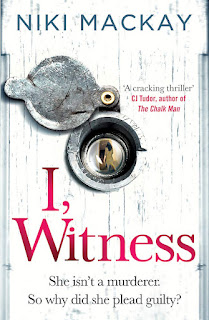I, Witness – Niki Mackay
The case that promises to pick things up for Madison and the reader is an unexpected one – unexpected for Madison certainly, since it relates back to the first murder investigation she worked on as a police detective – and the stirring up of old memories can’t help but make her feel she is back in the game. Kate Reynolds, the “angelic teen killer” has done six years in prison for the voluntary manslaughter of her friend Naomi Andrews, and now 24, the first thing she does is come straight back to one of the officers who worked on the case and asks her to prove her innocence. Or guilt, because Kate doesn’t really know herself, as she was high on drugs and alcohol at a party and in shock when she was found with a knife and Noami’s body.
It seemed an open and shut case at the time, particularly as Kate confessed to the killing, since even though she doesn’t remember doing it, she remembers wanting to do it. Perhaps because of that, the case wasn’t as thoroughly investigated as it might have been, because looking at it now Madison can see all kinds of warning signs and suspicious activity in the people and the family around Kate, not least of which is the history of mental illness that runs in the family, with her sister in care and her distant mother’s depression and suicide. Although just in case the reader is unconvinced and needs a reason to side with Kate, the author has already hinted in the prologue that her mother was murdered by the hand of one of her or – more likely – one of her siblings.
So the hook is good enough to keep you reading I, Witness even if the characterisation is fairly broad and, it has to be said, manipulative and devisive. The signs are there in the book’s narrative structure, each chapter taken up from the first person perspective of one of the characters. So you’ll get Madison’s take on the feelings stirred up by the reappearance of Kate, as well as her own concerns as a mother for her own child who has been removed from her care, then you’ll get Kate’s view of her efforts to adjust to life again and clear her name, but you also get the first-person views of Andrea, Naomi’s mother who is furious that her daughter’s killer has been released, and Claudia, the seemingly perfect housewife married to Kate’s brother Marcus.
What you will note from that line-up is that the perspective is an entirely female one, of women each with their own problems. Yes, it’s another book where women are abused, kept in the dark and conspired against by men and Niki Mackay doesn’t even try to present any kind of balanced perspective, knowing that the female paranoia provides a strong emotional tug that will conveniently cover over any holes in plotting and motivation. All of the men, to one extent or another, are abusive, secretive and scheming. Kate’s father and brother inexplicably never even visited her while she was in prison, and they still want to keep their distance. Or are they hiding something. Well, if they aren’t they’ve been behaving very suspiciously indeed all these years. There is one male voice – we presume – and unsurprisingly it’s Mr Italics who rants like a deranged psychopath in his inserts.
Although it serves the purposes of the paranoia murder-mystery well, it has to be said that even in first-person narrative viewpoints, the voices and thought processes (and not just those of Mr Italics) consistently strike a false note. Kate is naive, although her age, background and prison term might explain it, but both Andrea and Claudia’s voices are unconvincing, their only role in the novel seeming to be there as ways of introducing tensions and adding plot complications, although they do present in their own way different aspects of motherhood. It’s the fact that you can almost rationalise the characters behaviour that permits you to overlook the flaws in the plot and the banal stereotyping of the insensitive domineering male characters.
You’ll also hang in there as you want to see how Niki Mackay pulls off the concluding revelations that, despite conventional attempts at deflection, are actually well-signposted by the inadequate characterisation of all the male characters in the book. Unsurprisingly it’s incredibly ham-fisted and far from convincing, but what is really surprising is just how small a part Madison Attallee plays in it all and how quickly she fades into the background of her own investigation. That’s not a good sign.
I, Witness by Niki Mackay is published by Orion on 19th April 2018.




Comments
Post a Comment